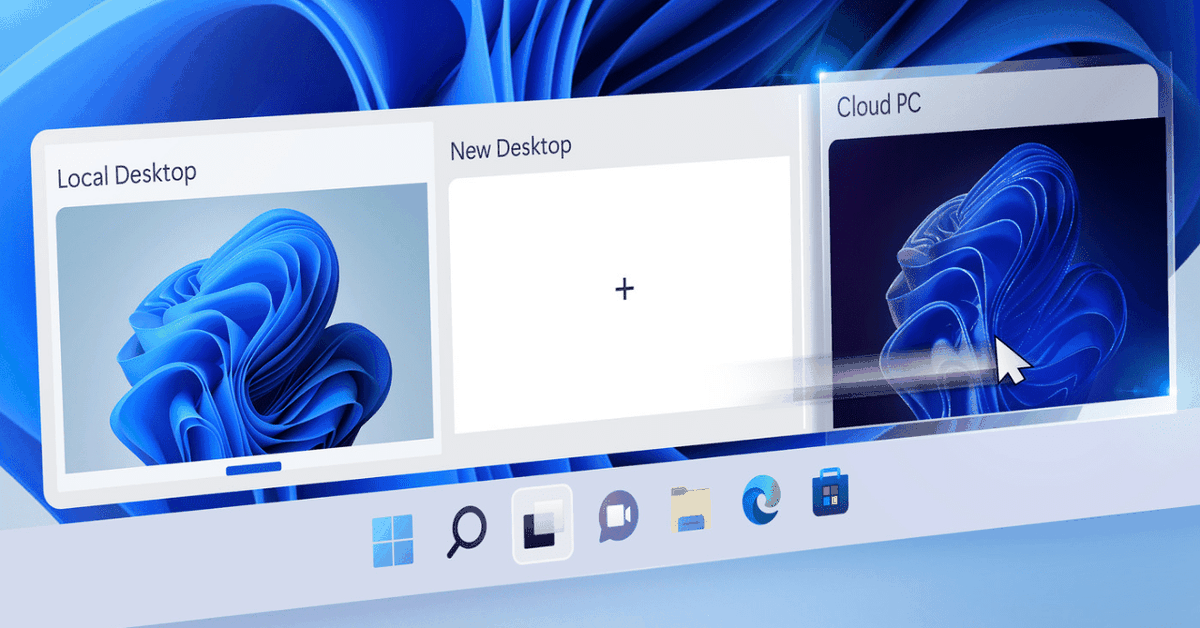“You will own nothing, and you will like it.”
deleted by creator
Feel like this may be missing needed context.
For example, if I say, “man, I’m going to take a huge bite out of that thing!” it’s a different conversation if I’m looking at a big sandwich versus looking at a newborn baby.
So… Anything else you might want to share about your specific statement or its focus?
Ignore brainwashed people man
Ironic. I guess they were thinking you meant in a “communism” sort of way?
Microsoft has recently announced Windows Copilot, an AI-powered assistant for Windows 11. Windows Copilot sits at the side of Windows 11, and can summarize content you’re viewing in apps, rewrite it, or even explain it. Microsoft is currently testing this internally and promised to release it to testers in June before rolling it out more broadly to Windows 11 users.
Oh my God, they’re bringing back clippy.
That means a whole new market of NFT Clippy Skins can be established.
That fixes the main problem with Clippy, which was not using a blockchain.
“It looks like you’re trying to defraud people. Would you like help with that?”
If it’s GPT4 though I might sell my soul for that kind of automation integrated into my PC…
Don’t worry, you will.
deleted by creator
It’s kind of a moot point imho because local llama models are getting real good. I think without an issue they might be able to run locally with additional dedicated hardware components in the PC. You could potentially allow for a fully customized locally run offline AI that’s integrated into the system. This might be feasible by the time Microsoft actually has some kind of cloud based version of windows on the market. At which point I’d probably just switch to Linux or any other OS that allows that kind of implementation.
It won’t be GPT4, because that would require them to pay actual money. It’ll be ChatGPT 3.5 at best and probably a cut down version of that.
That’s a big nope for me.
Internet goes out? I can still do some amount of work, now I need power and internet to both work to do any work at all.
Not a fan of this and I will not embrace it.
I guess that means more people switching to linux, assuming they eventually 100% phase out non-cloud. Not even because “cloud bad” - there will be some of that, but because of the sheer number of people who don’t pay for windows, not paying for it isn’t an option if they control it completely.
Yup, that’d also be the case for people like me who stick with Windows for gaming compatibility/convenience reasons and critical GPU features the Linux drivers just don’t implement (looking at you, DLDSR). That, or just anyone with a GPU, I suppose, assuming the hardware market would look remotely like it does nowadays by then.
There’s definitely going to be a push for cloud gaming / cloud GPU + VDI, and with GPU pricing going the way nvidia is doing right now isn’t going to help prevent adoption of that.
deleted by creator
Are we doing the nobody reads the article thing here too? This isn’t a replacement for Windows as an operating system, it’s a cloud based version of the OS being sold to consumers. They’re trying to compete with inexpensive Chromebooks, not take away your PC.
As an occasional sys admin, they’ve had stuff like this for enterprise forever, it’s just self hosted. This is about as surprising as the sun coming up, they’ve been moving lots of their enterprise tech to consumer subscriptions.
Why would I read the article? I don’t want to know the details. I want to be outraged.
I did, but it sounds like what the headlines implied to me
Microsoft has been increasingly moving Windows to the cloud on the commercial side with Windows 365, but the software giant also wants to do the same for consumers.
The idea of moving Windows fully to the cloud for consumers is also presented alongside Microsoft’s need to invest in custom silicon partnerships.
Yeah, it is fair to say it’s just an alternative option to a non cloud based OS, but some people are extrapolating based on Microsoft moves the past few years with the subscription model they’ve pushed for Office and OS coming with office versions that require you to sign in to an account to use.
And versions of Windows that don’t come with pre-installed ad apps like Facebook or Candy Crush aren’t commercially available.
No OS needs to be in the cloud. The moment this happens, it stops being a PC, and instead it’s just TV.
*Telescreen
No thank you.
Also I bet instead of a one-time license you can have the privilege of paying $9.99 a month forever or lose access to all your files. And possibly requiring an internet connection to use your desktop computer?
and I want to move fully off of windows, what a coincidence.
The situation has never been better for comfortably abandoning Windows. Come to Linux, we have penguins
tbh, windows user since the 90s, tried *nix desktops since the early 00s every few years. Used to have a thing where I would force myself to use it for 6 months and it would fail again and again.
In the last year, ive been using ubuntu (which i know isint the best desktop to use even) as a dev system on some of my work. Unlike in the past I am no longer finding an unreasonable delta between the user expectations in linux vs windows systems. I need to drop to a cli for both with ~ the same propensity once I do anything advanced. Not having a registry is a blessing I never thought I would be able to have in a rich visual system.
Long time .NET / Azure dev - moving to linux. After all, what do you think remote windows will run under-the-covers?
That’s a pretty similar story to mine. Used Linux pretty exclusively over a decade ago, then switched back for my gaming PC. Now that I’m back on Linux though, I don’t see any reason to use windows on anything but my company PC, Linux is just better IMO now.
As another dev here, I have barely used a PC/laptop outside of work in years. I got a gaming PC like 2 years back and don’t use it much. But every time I get the hankering for some personal dev project and have to mess with the registry I cry inside. I really need to just ditch it for Linux entirely. I’m so much more comfortable on Linux. You might just convince me to bite the bullet and remove it entirely since 90% of my gaming is on steamdeck anyway.
Since WSL2 and terminal preview I have spent more time doing “nix things” than windows things anyway, I even do a lot of windows file management through ubuntu since the Linux tools are more expressive.
Much of my day is web browser, cli and VSCode. The desktops are capable, at this point its more about getting used to a different set of keyboard shortcuts, my next build out will be a linux system for sure.
Azure Linux with a strong Wine hahahahaha
pretty much, though my understanding is they ended up making thier own “wine” that leverages hyper-v. Seems like they are still banking on thier own hypervisor. Can’t say I blame them. no way MS hands thier ops to VMWare.
EDIT: Honestly, I would expect NT4/Server2000 based windows to be sunset within a decade in place of a linux kernel version that has a window manager developed in microsoft’s signature style. A large number of newer UWP apps will port relatively easily if already written on .NET core and microsoft has indicated they are starting to think more like apple when it comes to some levels of compatibility.
Didn’t read the article.
The idea of online only software irritates me. Of course multiplayer games have to work this way. When blizzard and Ubisoft started requiring an active connection for single player games that was just going too far.
Can you imagine sitting at your computer, doing literally anything. The screen goes strait to blue with the windows shutting down screen saying, “Internet disrupted, please contact your provider for support”.
Or trying to do any work on the go? This whole idea is just idiotic to me.
They will have to continue to offer some kind of offline option it seems, for people with flaky internet connections.
Never mind flaky internet, what about people that do events?
Things like PowerPoint presentation machines, VJ systems, video servers (for massive multiscreen playback).
You can’t go into a field for a festival and expect reliable internet.
You can’t go into a theatre and expect reliable internet, especially when 3k+ people turn up.
There are a few systems that run OSX, but Apple’s hardware doesn’t give you as much control as something like an Nvidia Quadro with sync cards. 99% of the big shows will be ran from Windows OSApple can barely figure out how to get a picture out of their own hardware. Monitor support is surprisingly an afterthought in a graphical operating system often used by artists. I shouldn’t need to download scripts from GitHub to change my RGB monitor to run in RGB mode. With such an expensive computer, I should be able to connect multiple monitors at the same time like I can on much cheaper computers.
I guess even a chromebook has some sort of offline apps and storage.
ChromeOS is just a regular OS. Without internet, everything continues to work that was designed to work. It’s about the same as Windows that way.
However, Chromebooks have planned obsolescence, and most devices lose official OS updates after some number of years, with many having weird hardware that makes it difficult to move to another operating system.
Google tried that.
Anyway, I’ll stick with Linux.
With Chromebooks? ChromeOS is a pretty solid Linux distro if you’d ask me. It is built around cloud-sync and Google Drive, but otherwise perfectly fine to use offline. Even Steam is supported nowadays
The best thing I ever did with that one used Chromebook I bought was install Gallium OS on it. I ended up with a fully functioning laptop that was able to fulfill my mobile computing needs for $50. It’s a shame Gallium got discontinued. ChromeOS was very primitive and restrictive when I tried it 5 or 6 years ago, but you say they even support Steam now, so apparently they’ve made some improvements. Still wouldn’t want to use it over a Linux distro like Gallium that would let me have full control of the device, though.
In case anyone reading this is interesting in alternatives to ChromeOS, more info can be found here: https://mrchromebox.tech/#alt_os
I mean, you can at least run offline PWAs, Android apps and Linux apps on ChromeOS just fine. It doesn’t try to stream the entire desktop over as a service…
Ya I’d be fully Linux after that. Still too many benefits of having your own hardware.
Just another move toward " you will own nothing and you will be happy". Gotta resist the botnet people, Free software anarchy ftw!
The road to (technological) serfdom
But also donate to developers that spend their time making free software. Time costs money too
Microsoft has recently announced Windows Copilot, an AI-powered assistant for Windows 11. Windows Copilot sits at the side of Windows 11, and can summarize content you’re viewing in apps, rewrite it, or even explain it. Microsoft is currently testing this internally and promised to release it to testers in June before rolling it out more broadly to Windows 11 users.
Assuming this will use OpenAI API like other Microsoft’s AI products, this is going to be expensive to operate. Subsidizing it indefinitely is surely not an option. How would Microsoft monetize it? By charging subscription like GitHub Copilot, or monetizing it somehow using users data they collected? I assume it would be the latter.
There’s talk about Microsoft SoCs on their own products, much like Apple does the M1 SoCs.
These Microsoft SoCs would be used in Surface devices and likely have dedicated AI hardware. Again, much like Apple.
If we’re talking about specialized models, not one generic LLM for everything a la GPT4, they might not have to be THAT big and could run on reasonably powerful devices.
I really doubt that, at least for the next few years. “AI Assistant” usually means LLMs, and even M2 struggles to run them mostly due to large compute and RAM requirements. If Microsoft could somehow release a truly local AI assistant feature that can run on average windows users’ hardware, that would be shake the whole ML industry.
True, but they could get the base requirements of a task using OpenAI and then use specialized models locally to do subtasks.
Microsoft owns 49% of OpenAI, they don’t need to pay nearly as much per request as we do and the cost will likely decrease over time too.
I know they own some stakes at OpenAI, but I didn’t know it’s 49%. No wonder they go full steam with OpenAI stuff lately.
Okay but what happens if you don’t have a good net connection like at the coffee shop or airports? I swear sometimes people are clueless and just assume you always have good internet when that’s not often the case!
deleted by creator
Haha that will be the year of the Linux desktop, in many ways
That was two years ago for me. Always happy to see articles like this.
Almost 20 percent of users are on mac. Linux desktops are still less than 3 percent.
The majority of new server-based innovation is on Linux. Desktop Linux is objectively better than either alternative these days. Given how slick and easy to use the free Linux desktop distros have become. It really should be more popular as a desktop OS.
Don’t underestimate the potential of Desktop Linux - the lack of adoption is a running joke, but M$FT doing something exceptionally stupid, e.g. forcing an LLM inside an OS (which sounds like clippy on acid), could trigger an awakening and “the great migration” someday
https://itsfoss.com/linux-market-share/#operating-system-market-share-june-2023
Might finally convince me to move fully to Linux…
one of us
One of us!
I’m very close to being ready to move full time to Linux anyway. Needing to access the cloud for all my Windows junk would be the end for me.
One of us! One of us!






















